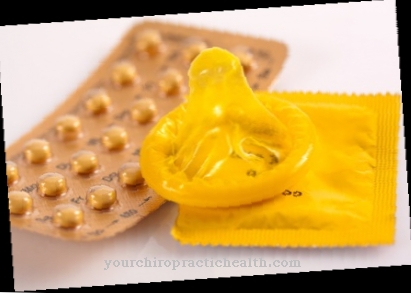Pregnancy can also be prevented when it is actually too late - with the Morning-after pill. However, it is important to act quickly. The earlier it is taken after unprotected intercourse, the higher the efficiency.
What is the morning-after pill?

The Morning-after pill is a hormone preparation. Depending on the product, one or two tablets are taken. The main mode of action is to prevent or delay ovulation.
So fertilization should be avoided. The morning-after pill can be taken up to 72 hours after coitus. If this happens in the first 24 hours, the pregnancy rate is 0.4 percent, but after three days it is 2.7 percent.
Since 2010 there has been a new preparation that can even be taken up to five days after sexual intercourse. Both pills require a prescription in Germany.
Medical application & effects
The older one" Morning-after pill contains the hormone levonorgestrel, a progestin. It inhibits the so-called luteinizing hormone, which triggers monthly ovulation in women.
How levonargestrel also works is not one hundred percent clear. It is discussed whether the preparation can also prevent an already fertilized egg from implanting in the uterine lining - an ethically important question for many people. On the other hand, it is certain that the high progestin concentration provokes the formation of mucus in the cervix and changes the pH value in the uterine lining. This has consequences for the sperm: their migration from the vagina into the uterus is hindered and they become less mobile.
If you are already pregnant, taking the morning-after pill (containing the active ingredient levongestrel) has no consequences. There is no danger to the unborn child.
Herbal, natural & pharmaceutical forms & types
The preparation Ulipristal has only been on the market for a few years, dubbed the "pill for even longer after" in the press. Ulipristal blocks receptors for the luteal hormone (progesterone), which is produced in the ovaries.
This also prevents ovulation. This pill can be taken up to five days after sexual intercourse. It is considered even safer than levongestrel. However, there is still insufficient data collection on effects on an existing pregnancy, so that this must be ruled out before prescribing.
Are there any non-chemical alternatives to this Morning-after pill? A relatively safe method is if the woman has a copper IUD (intrauterine device) inserted up to five days after coitus. As a foreign body, the coil causes inflammation of the uterine lining. An egg cell cannot implant. There is a 95 percent chance that pregnancy will be prevented.
The rhombus herb is sometimes recommended as a natural morning-after pill. It is supposed to stimulate the body's own release of adrenaline and thus increase the permeability of the uterine lining, so that an egg is shed. Rhombus is drunk as a tea infusion or taken as rutin in tablet form. Both alternatives mentioned have in common that they do not prevent fertilization.
Even later, teas - if they work - that are ideally drunk on the first day of the absence of menstruation work. They consist of two components, for example pennyroyal and lady's mantle or cotton plant and snake herb. They are supposed to provoke the rejection of the uterine lining, including the embedded egg - so they do not work as an morning-after pill, but want to bring about an early abortion.
Risks & side effects
Side effects of Morning-after pill can be nausea, headache, and pelvic pain. Intermenstrual bleeding is also possible and menstruation can be delayed by up to a week.
If you vomit three hours or sooner after taking the morning-after pill, you should take another pill. Women who are at risk of fallopian tube inflammation, fallopian tube or ectopic pregnancy should definitely consult their doctor before taking the morning-after pill.
The effect of the birth control pill is impaired by the morning-after pill. It is necessary to use additional contraception with condoms. The experts disagree as to whether the contraceptive pill should continue to be taken or whether it should be discontinued until the next cycle begins.



.jpg)










.jpg)













